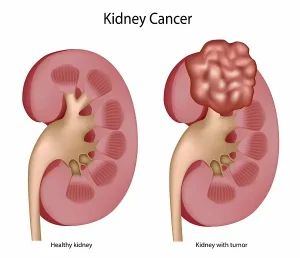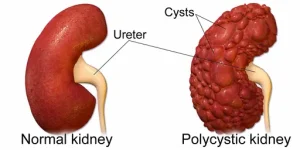The kidneys are one of the most important organs in our body. It is about the size of an adult fist, located at our lower back. It is commonly known for its excretory function – filtering 200 litres of blood daily to produce around 2 litres of urine. It is an important organ in maintaining the human body’s blood pressure, electrolyte balance and calcium level. Kidney cancer begins in the cell of the kidneys.
A kidney tumour is formed when kidney cells start to proliferate in an uncontrolled manner. And when the tumour starts to grow in other organs other than kidneys, it would be called kidney cancer. With tumour formation in the kidney, it can disrupt part of or all of the kidney’s function, depending on its size and location. The most common form of kidney cancer – renal cell carcinoma (RCC) is the 9th most common cancer in men, and the 14th most common cancer in women.

Figure 1. Kidney tumour
Prevalence of Kidney Cancer
A recent 2018 study shows that the US and Europe have the highest rate of kidney cancer – 11.8/100 000 in the general population. Eight studies over the past decades in Asian countries have found Japan with the highest incidence rates – 11.6/100 000 in males and 5.6/100 000 in females. In Korea, the incidence was slightly lower than in Japan; Jung et al described a mortality rate in men of 2.3/100 000 and 0.9/100 000 in women, with a five-year survival of 77.7 %. Studies in Australia have observed an upward trend in both incidence rate and survival rate.
Symptoms of Kidney Cancer
Kidney cancer usually does not have signs or symptoms in early stages. However, as it keeps developing and growing bigger, it causes many symptoms akin to chronic kidney disease, such as:
- Nausea
- Vomiting
- Loss of appetite
- Fatigue and weakness
- Dark coloured urine
- Decreased mental sharpness
- Pain in the back
- Fever not associated with flu or a cold
Many of the symptoms are non-specific and can be present in other diseases as well. Most likely they do not manifest until late stage. However, it is always better to diagnose any type of cancer at an early stage. It’s important for patients to report all symptoms to health practitioners.
Causes of Kidney Cancer
Many people are more prone to have kidney cancer compared to others in the general population due to genetic factors. And many of them are poorly understood. Some of the well-established factors are listed below:
Smoking
Smoking is the world’s No.1 risk factor that causes kidney cancer among many other diseases. The lung takes in the cancer-causing chemicals in cigarettes and passes it across our body in cardiovascular systems. It not only gives the kidney extra workload, but also predisposes kidney cells to unwanted genetic mutations that can induce uncontrolled kidney cell proliferation.
Family history
Family history of kidney cancer indicates the presence of certain genes in your body that make you prone to have this cancer as well. However as mentioned the exact mechanism is poorly understood by the scientific community.
High blood pressure
Higher than normal blood pressure puts extra load to kidney blood vessels and can result in genetic mutation of kidney cells.
Polycystic kidney disease (PKD)
Polycystic kidney disease causes numerous fluid-filled cyst growth in the kidneys. When the cysts accumulate in size and number, it can result in loss of kidney function. It not only increases the risk of developing kidney cancer, but also predisposes patients to liver and colon cancer.

Figure 2. Healthy-vs.-Polycystic-kidney
Other uncommon causes include obesity, diabetes, older age, and long-term dialysis.
Diagnosis of Kidney Cancer
Multiple diagnostic tests should be utilised to reach a conclusive diagnosis.
- Blood and urine test – test for blood toxin level and evaluate kidney function
- Ultrasound scan – gross kidney tumour can be seen on ultrasound scan
- MRI scan – confirm exact location and size of kidney tumour
- Kidney biopsy – take small needle samples from the kidney to test for specific tumour markers.
Treatment of Kidney Cancer
Most of the kidney cancer require surgical intervention.
- Radiofrequency ablation: use high energy waves directed at the location of kidney tumour to kill the mutated cells. Your doctor will insert a needle into the tumour and deliver the energy wave.
- Surgery: Removal of part of or the whole kidney could be considered based on the stage of kidney cancer.
- Lifestyle modifications: Quit smoking, healthy diet, exercise etc.
Prevention
- Abstain from smoking: smoking is the single most significant risk factor for kidney cancer, and many other diseases.
- Blood pressure management: This can be achieved by a healthy balance diet, regular exercise, and healthy lifestyle.
- Weight management: Obesity could increase risk of high blood pressure, and subsequently kidney cancer.
